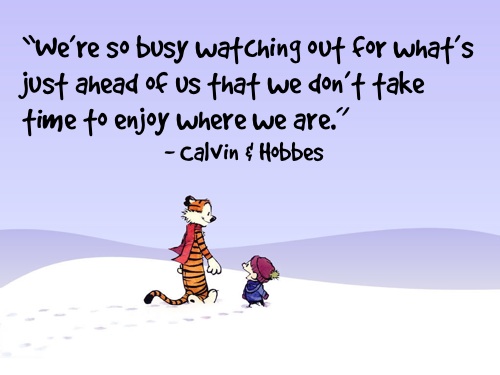I love calm. I crave calm. I weep for calm. It also doesn't take much to unhinge my calm. I'm easily excitable. "Oh no, they stopped carrying that whole bran matzah I liked? Whatever am I to do?"
Since my nerves are more on the hysterical side, I make a point to soothe whatever areas of my life I can control to maintain equilibrium. I go to bed at the same time so I can wake up at the same time, which provides me sufficient time to prepare for the day, so I don't run out the door half-dressed, unpainted, and prayer-free. I am usually first at any occasion or appointment, preferring to be bored and prompt than frantic and late. When I babysit my method is to cast a spell of calm over the critters, since they are just so reasonable when they are mellow. "Bedtime? Cool."
I need time to acheive calm, brainspace to establish calm, I need to think to aspire to calm. One of my concerns about the smartphone is that it robs us of any unoccupied time when we could be doing the necessary thinking to streamline our lives, whether in scheduling, relationships, or to simply breathe for a minute.

But navigating the clutter in our own heads is not necessarily pleasant. There may be monsters lurking in our subconscious that we would rather not have to vanquish. So we dive into "busyness," and never surface.

As Kate Murphy writes in "No Time to Think":
In 11 experiments involving more than 700 people, the majority of participants reported that they found it unpleasant to be alone in a room with their thoughts for just 6 to 15 minutes.
In 11 experiments involving more than 700 people, the majority of participants reported that they found it unpleasant to be alone in a room with their thoughts for just 6 to 15 minutes.
Moreover, in one experiment, 64 percent of men and 15 percent of women began self-administering electric shocks when left alone to think. These same people, by the way, had previously said they would pay money to avoid receiving the painful jolt.
It didn’t matter if the subjects engaged in the contemplative exercise at home or in the laboratory, or if they were given suggestions of what to think about, like a coming vacation; they just didn’t like being in their own heads.
It could be because human beings, when left alone, tend to dwell on what’s wrong in their lives. We have evolved to become problem solvers and meaning makers. What preys on our minds, when we aren’t updating our Facebook page or in spinning class, are the things we haven’t figured out — difficult relationships, personal and professional failures, money trouble, health concerns and so on. And until there is resolution, or at least some kind of understanding or acceptance, these thoughts reverberate in our heads. Hello rumination. Hello insomnia.
Yes, I am a ruminator. And yes, there are times when I do dwell on the unpleasantly unresolved; heck, I can't stand it when I have to return a mascara to Sephora, never mind being single (may that be the worst to obsesses over). But if I didn't give myself time to think, I would not have any plan for the day, how to be more efficient, how to take care of the factors within my control, what would be the best thing to say to so-and-so.
But you can’t solve or let go of problems if you don’t allow yourself time to think about them. It’s an imperative ignored by our culture, which values doing more than thinking and believes answers are in the palm of your hand rather than in your own head.
Thinking, the article continues, detracts the power of negativity; if such feelings were ingnored, all sorts of mental as well as physical ailments take form. Thinking increases empathy. Thinking is the fount of creativity.
Hard as they sometimes are, negative feelings are a part of everyone’s life, arguably more so if you are crazy busy. But it’s those same deep and troubling feelings, and how you deal with them, that make you the person you are. While busyness may stanch welling sadness, it may also limit your ability to be overcome with joy.

No comments:
Post a Comment